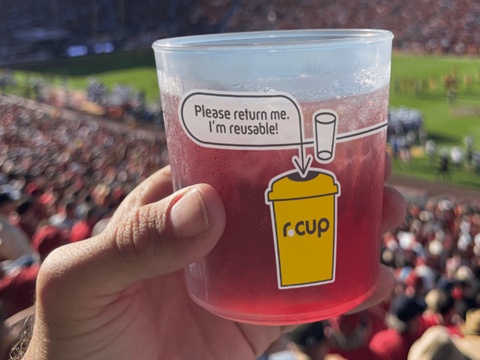
Reusable packaging provider r.World claims its reverse logistics and sanitizing solutions have kept 20 million single-use cups and foodware items out of landfills and avoided the production of over 110 tons of plastics.
Back in July 2023, r.World – then known as r.Cup – worked alongside The Coca-Cola Company to bring reusable polypropylene cups to a range of venues and cities in the USA.
Now its operations are said to span across twelve countries, serving large venues, campuses, and corporations. r.World emphasizes that its products are made in the United States, thus cutting down on shipping distances and carbon footprints when serving American entities like the UC Berkeley football stadium, entertainment company Live Nation, and the Red Rocks Amphitheatre.
Customers can create an r.World account and order the necessary size and quantity of reusable cups and serveware for their event via the r.Turn app. This platform allows users to track the life cycle of each unit in their venue, generating monthly reports on each customer’s environmental impacts.
After the cups and foodware have been used, consumers can return their items to a customized bin. Here, the nearest r.World crew will collect them for washing in an Ecolab-certified process. Each product is reportedly inspected and repacked by hand before it is redistributed in an effort to prevent contaminated items out of circulation.
According to r.World, its cups and utensils can be reused up to 300 times – and the items are recycled into other ‘usable’ products at end-of-life, the company says.
So far, its reuse efforts are believed to have eliminated 440 U.S. tons of CO2 emissions, saved 1,650,000 kWh of energy, and conserved 5,000,000 gallons of water. Reuse systems are also believed to lower costs otherwise spent on replacing single-use items, waste management expenses, and disposal fees, with participating venues said to have cut waste costs by up to 50%.
Additionally, sustainability fees, sponsorships, and high return rates are thought to generate revenue. Citing 90%+ return rates among its systems, r.World describes its approach as a “financially smarter choice” than single-use alternatives.
The company adds that its current progress ‘indicates the effectiveness of scalable reuse models and their role in the growing movement towards a circular economy.’
“Eliminating 20 million single-use items is irrefutable proof reuse at scale is achievable, profitable, and impactful,” says Michael Martin, r.World founder and CEO. “This milestone validates our belief a better way to tackle waste is possible, one that’s environmentally responsible and economically viable.”
In similar news, Circulayo says that its smart reuse technology had avoided 740,638 single-use products as of July 2025. The company intends to help local businesses transition into reuse with QR-enabled data tracking, branding customizability, and an upcoming ‘frictionless’ deposit system.
Reusables.com also offers an RFID-enabled, zero-deposit reuse system for reusable foodservice containers. These can be returned to smart return bins located across university campuses, offices, hospitals, and other institutions – a move hoped to reduce single-use waste and streamline operational costs.
Borro also provides a ‘frictionless’ reuse system for beverage cups served at events. Its app-free, QR-driven return process is thought to be ‘as easy as single-use’ and aims to improve return rates and consumer satisfaction.
If you liked this story, you might also enjoy:
The ultimate guide to the Packaging and Packaging Waste Regulation in 2025
How are the top brands progressing on packaging sustainability?
Everything you need to know about global packaging sustainability regulation in 2025
The key to increasing the use of reusable packaging in supermarkets














No comments yet